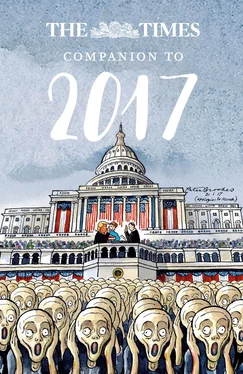“My daughter died for nothing, for an illusion, for a folly. It’s absurd,” Salines said in L’Indicible de A à Z ( The Unspeakable from A to Z ), a book about his reaction to the attacks.
In it, he describes Lola, who worked in the children’s books department of a publisher, in these terms: “You liked books, films, drawing, travelling, rock music, children, Billy the Cat, lemon tart, Belgian beer, brunch at the Bouillon Belge bar, singing while playing the ukulele, roller derbies, your friends, your mum, your brothers, your boyfriend, your girlfriends, a kiss on the cheek, making love. You loved life. And all those who knew you liked you.”
The months have passed and the scars remain — physical or psychological — for those involved.
Sophie needed two operations, three general anaesthetics — the third to change her bandages — and 43 stitches. She has a bullet in her pelvis and fears that grip her day and night.
“When I go to sleep, I still see what happened almost every night. Either I see them or I hear them. There is the fear. For a long time it was very complicated to leave home. I still don’t take the métro or commuter trains. I only take the bus.
“Before, it was simple to make plans. Now I advance day by day. When I go to bed I wonder what will happen tomorrow and what will I see on the news.”
Christophe Molmy has been affected, too: “You don’t emerge unscathed from an intervention like the Bataclan. It’s impossible.”
He organised sessions with psychologists for his brigade and gave them and their families the opportunity to make appointments on a one-to-one basis. Some did; the majority did not. “We are still in a macho culture where we say, ‘Nah, I don’t need that,’ but in fact we need it,” he says. “I saw the psychologist.”
We meet in his office at the end of a warren of corridors in the 19th-century building that is the Parisian equivalent of Scotland Yard. He had never confronted terrorism before 2015. Now he lives permanently with the threat — a phone at his side at all times, in the shower, everywhere — and admits it has changed his job. “We always used to intervene against gangsters whom we tried not to kill. Today if we go in against terrorists, we go to kill the terrorists. We won’t manage to get them to put their hands up.
“We are becoming a little like paramilitaries. We are training and equipping ourselves like soldiers to fight a war.”
He talks about the old days of fighting criminals with a certain fondness. “We arrested them; they behaved well; we understood each other. We could have a bite to eat together. But what am I supposed to do with people who come to die? The human relationship is not the same. I don’t even know if there is a human relationship.”
Surprisingly, perhaps, Georges Salines seems almost the most sanguine of all, despite the loss of his daughter. When we meet in his office, he looks bright-eyed, and says in his book, “I am sad from time to time, I sometimes cry, but I sleep, I work, I talk and I sometimes laugh. You can’t avoid the suffering but resilience is possible, particularly in a family whose members love each other.”
Salines is head of 13 Novembre: Fraternité et Vérité, an association set up by victims two months after the attacks, and he has used the post to denounce the shambolic organisation faced by relatives of victims in the aftermath of the attack — some being shown the wrong body in the morgue. But he is not vindictive, and insists on the need to heal the split in French society, to avoid marginalising Muslims and pushing them into the arms of the terrorists.
He says in his book that he has no hatred for the jihadists. “I have never experienced this feeling,” he says. “I cannot hate the sinister cretins who took my daughter’s life and lost theirs in this business. They are victims, too.”
Antoine Leiris, a French radio journalist, has written a book, too, after losing a loved one — Hélène Muyal-Leiris, his 35-year-old wife — at the Bataclan. As with Salines, the book is more about love than hate: Vous N’Aurez Pas Ma Haine ( You Will Not Have My Hatred ) is the title.
Leiris recounts his love for his wife, and for Melvil, their 17-month-old son — and his fear, uncertainty and pain at the realisation that he will have to bring up Melvil on his own. Of the killers, he has little to say. “I don’t know who you are and I don’t want to know. You want me to be frightened; you want me to look at my fellow citizens with suspicion; you want me to sacrifice my liberty for security. I won’t.”
Claude-Emmanuel Triomphe, who had two operations and a month in hospital after being injured in Café Bonne Bière, says much the same thing. “I feel indifference for them. I feel no hatred. I tried to have hatred; I thought it’s not normal after all they did to me. If I must express a feeling it is rather pity — pity in the sense that these guys have massacred their own lives: ‘Not only have you massacred the life of other people but you have messed up yours as well.’”
He says he has no nightmares, no worries about going out. After months of lethargy he has rediscovered some of his old intellectual energy, too. Nothing is quite the same now, however.
Having given up his post as head of a think tank, he wants to specialise in the estates that are home to a generation of second-generation immigrants, among whom a handful have turned to radical Islamist violence.
“I need to understand why my country is affected by terrorism, why my country has manufactured more jihadists than any other in Europe. It’s not to say that other countries are not affected, but France is particularly so.”
The incomprehension is widespread in France, and it is Sophie, perhaps, who sums it up best. “You ask yourself questions: what was in their heads when they did that? The youngest terrorist at the Bataclan was 23. Me at 23, I was in Lyons, in university and thinking how I was going to dress the next day and not going to a concert hall to kill people. These are questions that remain and to which we will not have an answer.”
YOU CAN’T TRUST THE PEOPLE WITH DEMOCRACY
Roger Boyes
OCTOBER 5 2016
IT MUST HAVE seemed like a shoo-in for the Colombian president Juan Manuel Santos. After four years of negotiation with Farc guerrillas, a peace deal was unveiled to the accompaniment of a choir singing Beethoven’s Ode to Joy . After half a century of debilitating war, how could anyone vote against peace in the subsequent referendum? In the end, though, he set himself up. It was a bit like the US civil war general whose last words, glancing at the enemy lines, were: “They couldn’t hit an elephant from that dista …”
It wasn’t just the Colombian referendum that went awry. There is a quiet revolt under way across the globe. In vote after vote, people have been rejecting the guidance of political establishments, baffling elites and adding to the sum of anger in the world. In the age of rage, direct democracy is a risk. Referendums are infallible only for dictators — think of Napoleon, master of the strategic plebiscite — when instructions are handed down to voters, when ballot boxes are stuffed and there’s a secret police snitch living next door.
The fact is that in free societies a government should not abdicate its responsibility to govern by using a single-issue vote to demand guidance from ordinary punters. Clearly if you want to avert a populist avalanche you should keep capital punishment or mosque-building off the ballot paper. And by now leaders should have learnt too that referendums are not a suitable vehicle for deciding on war, peace or immigration. Viktor Orban, the Hungarian prime minister, has just asked his citizens the impossibly loaded question: “Do you agree that the European Union should have the power to impose the compulsory settlement of non-Hungarian citizens in Hungary without the consent of the National Assembly of Hungary?” Of those who voted, 98 per cent rejected the idea, as was intended. But most voters stayed at home, perhaps sensing that the vote wasn’t about migrant quotas at all (since they are more or less off the table anyway) but rather propelling Orban to a new level in his gladiatorial contest with Brussels. Many Hungarians are quite comfortable inside the EU.
Читать дальше












